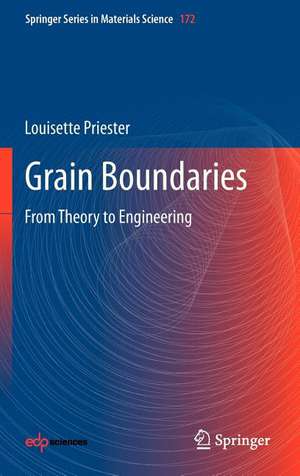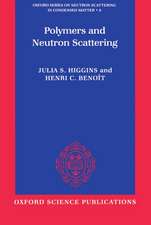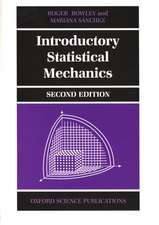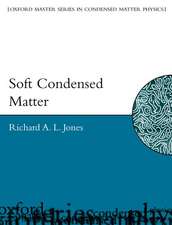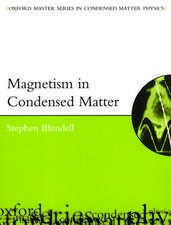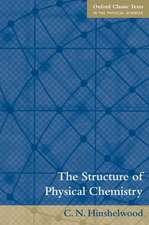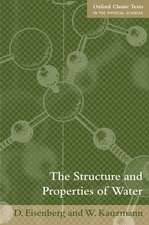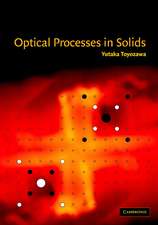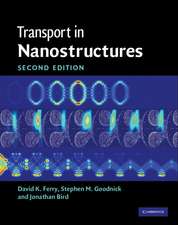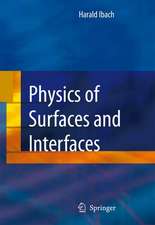Grain Boundaries: From Theory to Engineering: Springer Series in Materials Science, cartea 172
Autor Louisette Priesteren Limba Engleză Hardback – 27 noi 2012
This book presents the theoretical basis of the study of grain boundaries and aims to open up new lines of research in this area. The treatment is light on mathematical approaches while emphasizing practical examples; the issues they raise are discussed with reference to theories. The general approach of the book has two main goals: to lead the reader from the concept of ‘ideal’ to ‘real’ grain boundaries;
to depart from established knowledge and address the opportunities emerging through "grain boundary engineering", the control of morphological and crystallographic features that affect material properties.
The book is divided in three parts:
I ‘From interganular order to disorder’ deals with the concept of the perfect grain boundary, at equilibrium, and questions the maintenance of its crystalline state.
II ‘From the ideal to the real grain boundary’ deals with the concept of the faulted grain boundary. It attempts to reveal the influence of the grain boundary structure on its defects, their formation and their accommodation.
III ‘From free to constrained grain boundaries’ is devoted to grain boundary ensembles starting from the triple junction (the elemental configuration) to real grain boundary networks in polycrystals
This part covers a new and topical development in the field. It presents for the first time an avenue for researchers working on macroscopic aspects, to approach the scale of description of grain boundaries.
Audience: graduate students, researchers and engineers in Materials Science and all those scientists pursuing grain boundary engineering in order to improve materials performance.
| Toate formatele și edițiile | Preț | Express |
|---|---|---|
| Paperback (1) | 1219.29 lei 6-8 săpt. | |
| SPRINGER NETHERLANDS – 14 dec 2014 | 1219.29 lei 6-8 săpt. | |
| Hardback (1) | 1225.46 lei 6-8 săpt. | |
| SPRINGER NETHERLANDS – 27 noi 2012 | 1225.46 lei 6-8 săpt. |
Din seria Springer Series in Materials Science
- 18%
 Preț: 1820.22 lei
Preț: 1820.22 lei - 18%
 Preț: 776.09 lei
Preț: 776.09 lei - 24%
 Preț: 689.69 lei
Preț: 689.69 lei - 18%
 Preț: 968.96 lei
Preț: 968.96 lei - 20%
 Preț: 568.95 lei
Preț: 568.95 lei - 18%
 Preț: 953.65 lei
Preț: 953.65 lei - 18%
 Preț: 902.36 lei
Preț: 902.36 lei - 18%
 Preț: 953.65 lei
Preț: 953.65 lei - 20%
 Preț: 948.42 lei
Preț: 948.42 lei - 18%
 Preț: 1143.07 lei
Preț: 1143.07 lei - 18%
 Preț: 1111.53 lei
Preț: 1111.53 lei - 18%
 Preț: 1103.62 lei
Preț: 1103.62 lei - 18%
 Preț: 1225.94 lei
Preț: 1225.94 lei -
 Preț: 473.91 lei
Preț: 473.91 lei - 18%
 Preț: 782.42 lei
Preț: 782.42 lei -
 Preț: 433.47 lei
Preț: 433.47 lei - 18%
 Preț: 1116.40 lei
Preț: 1116.40 lei - 18%
 Preț: 946.24 lei
Preț: 946.24 lei - 18%
 Preț: 945.20 lei
Preț: 945.20 lei - 18%
 Preț: 1114.21 lei
Preț: 1114.21 lei - 15%
 Preț: 641.20 lei
Preț: 641.20 lei - 18%
 Preț: 958.56 lei
Preț: 958.56 lei - 18%
 Preț: 1224.36 lei
Preț: 1224.36 lei - 15%
 Preț: 644.82 lei
Preț: 644.82 lei - 24%
 Preț: 833.45 lei
Preț: 833.45 lei - 24%
 Preț: 1060.36 lei
Preț: 1060.36 lei - 18%
 Preț: 964.10 lei
Preț: 964.10 lei - 18%
 Preț: 1224.36 lei
Preț: 1224.36 lei - 18%
 Preț: 1221.20 lei
Preț: 1221.20 lei - 18%
 Preț: 946.87 lei
Preț: 946.87 lei - 18%
 Preț: 1836.92 lei
Preț: 1836.92 lei - 15%
 Preț: 643.34 lei
Preț: 643.34 lei - 18%
 Preț: 1246.32 lei
Preț: 1246.32 lei - 18%
 Preț: 956.81 lei
Preț: 956.81 lei - 18%
 Preț: 953.52 lei
Preț: 953.52 lei - 15%
 Preț: 637.59 lei
Preț: 637.59 lei
Preț: 1225.46 lei
Preț vechi: 1494.45 lei
-18% Nou
Puncte Express: 1838
Preț estimativ în valută:
234.57€ • 254.88$ • 197.16£
234.57€ • 254.88$ • 197.16£
Carte tipărită la comandă
Livrare economică 21 aprilie-05 mai
Preluare comenzi: 021 569.72.76
Specificații
ISBN-13: 9789400749689
ISBN-10: 9400749686
Pagini: 464
Ilustrații: XXII, 442 p.
Dimensiuni: 155 x 235 x 30 mm
Greutate: 0.82 kg
Ediția:2013
Editura: SPRINGER NETHERLANDS
Colecția Springer
Seria Springer Series in Materials Science
Locul publicării:Dordrecht, Netherlands
ISBN-10: 9400749686
Pagini: 464
Ilustrații: XXII, 442 p.
Dimensiuni: 155 x 235 x 30 mm
Greutate: 0.82 kg
Ediția:2013
Editura: SPRINGER NETHERLANDS
Colecția Springer
Seria Springer Series in Materials Science
Locul publicării:Dordrecht, Netherlands
Public țintă
ResearchCuprins
From the Contents: Part 1: From intergranular order to disorder.- Introduction: brief history of the intergranular order concept.- Geometrical order.- Mechanical stress order.- Atomic order.- Order or disorder at high temperature.- Grain boundary order and energy.- Grain boundary order or disorder: what conclusion?.- Part 2: From the ideal grain boundary to the real grain boundary.- Defects in the grain boundary structure.- Intergranular segregation.- Precipitation at grain boundaries.- Interactions between dislocations and grain boundaries.- Relaxation of the intergranular stresses.- Part 3: From the free grain boundary to the constrained grain boundary.- The triple junction.- Grain boundary network - grain boundary texture.
Notă biografică
Emeritus Professor Louisette Priester
Universite Paris 11
She is a specialist on grain boudaries and dedicated to this subject her entire career as a researcher and teacher. She has 150 contributions on the topic.
Universite Paris 11
She is a specialist on grain boudaries and dedicated to this subject her entire career as a researcher and teacher. She has 150 contributions on the topic.
Textul de pe ultima copertă
Grain boundaries are a main feature of crystalline materials. They play a key role in determining the properties of materials, especially when grain size decreases and even more so with the current improvements of processing tools and methods that allow us to control various elements in a polycrystal.
This book presents the theoretical basis of the study of grain boundaries and aims to open up new lines of research in this area. The treatment is light on mathematical approaches while emphasizing practical examples; the issues they raise are discussed with reference to theories. The general approach of the book has two main goals: to lead the reader from the concept of ‘ideal’ to ‘real’ grain boundaries;
to depart from established knowledge and address the opportunities emerging through "grain boundary engineering", the control of morphological and crystallographic features that affect material properties.
The book is divided in three parts:
I ‘From interganular order to disorder’ deals with the concept of the perfect grain boundary, at equilibrium, and questions the maintenance of its crystalline state.
II ‘From the ideal to the real grain boundary’ deals with the concept of the faulted grain boundary. It attempts to reveal the influence of the grain boundary structure on its defects, their formation and their accommodation.
III ‘From free to constrained grain boundaries’ is devoted to grain boundary ensembles starting from the triple junction (the elemental configuration) to real grain boundary networks in polycrystals
This part covers a new and topical development in the field. It presents for the first time an avenue for researchers working on macroscopic aspects, to approach the scale of description of grain boundaries.
Audience: graduate students, researchers and engineers in Materials Science and all those scientists pursuing grain boundary engineering in order to improve materials performance.
This book presents the theoretical basis of the study of grain boundaries and aims to open up new lines of research in this area. The treatment is light on mathematical approaches while emphasizing practical examples; the issues they raise are discussed with reference to theories. The general approach of the book has two main goals: to lead the reader from the concept of ‘ideal’ to ‘real’ grain boundaries;
to depart from established knowledge and address the opportunities emerging through "grain boundary engineering", the control of morphological and crystallographic features that affect material properties.
The book is divided in three parts:
I ‘From interganular order to disorder’ deals with the concept of the perfect grain boundary, at equilibrium, and questions the maintenance of its crystalline state.
II ‘From the ideal to the real grain boundary’ deals with the concept of the faulted grain boundary. It attempts to reveal the influence of the grain boundary structure on its defects, their formation and their accommodation.
III ‘From free to constrained grain boundaries’ is devoted to grain boundary ensembles starting from the triple junction (the elemental configuration) to real grain boundary networks in polycrystals
This part covers a new and topical development in the field. It presents for the first time an avenue for researchers working on macroscopic aspects, to approach the scale of description of grain boundaries.
Audience: graduate students, researchers and engineers in Materials Science and all those scientists pursuing grain boundary engineering in order to improve materials performance.
Caracteristici
Written by an expert in the field Offers the first complete overview of grain boundaries Leads researchers working on macroscopic aspects, closely related to materials properties, to approach the scale of description of grain boundaries Explores opportunities emerging through "grain boundary engineering" to control morphological and crystallographic features Includes supplementary material: sn.pub/extras
